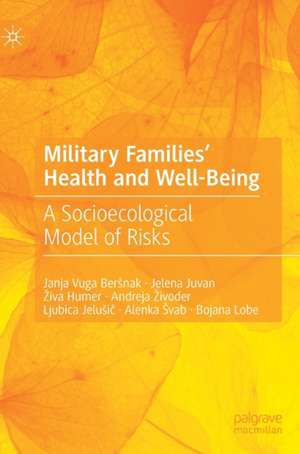Military Families' Health and Well-Being: A Socioecological Model of Risks
Autor Janja Vuga Beršnak, Jelena Juvan, Živa Humer, Andreja Živoder, Ljubica Jelušič, Alenka Švab, Bojana Lobeen Limba Engleză Hardback – 4 mar 2023
Preț: 781.00 lei
Preț vechi: 952.43 lei
-18% Nou
Puncte Express: 1172
Preț estimativ în valută:
149.46€ • 155.15$ • 124.63£
149.46€ • 155.15$ • 124.63£
Carte tipărită la comandă
Livrare economică 24 martie-07 aprilie
Preluare comenzi: 021 569.72.76
Specificații
ISBN-13: 9783031233593
ISBN-10: 303123359X
Pagini: 203
Ilustrații: XVI, 203 p.
Dimensiuni: 148 x 210 mm
Greutate: 0.41 kg
Ediția:2023
Editura: Springer International Publishing
Colecția Palgrave Macmillan
Locul publicării:Cham, Switzerland
ISBN-10: 303123359X
Pagini: 203
Ilustrații: XVI, 203 p.
Dimensiuni: 148 x 210 mm
Greutate: 0.41 kg
Ediția:2023
Editura: Springer International Publishing
Colecția Palgrave Macmillan
Locul publicării:Cham, Switzerland
Cuprins
1. Introduction.- 2. Social Changes in Family Life During the Past Few Decades.- 3. The Broader Social Context Affecting Military Family Health Outcomes.- 4. The Theoretical Model of Military-Specific Risk or Protective Factors for Military Family Health Outcomes.- 5. The Health Outcomes in Military Families.- 6. Risks for the Health of the Military Family Compared to the Civilian One: The Regression.- 7. Discussion: Impact of Military-Specific Risk/Protective Factors for Military Family's Health Outcomes.- 8. Conclusion: Select Measures Suggested by the Research Team.
Notă biografică
Janja Vuga Beršnak is Associate Professor in the Faculty of Social Sciences at University of Ljubljana, Slovenia. Her research interests include peace operations, military sociology (family, gender, children, and motivation), and crisis management.
Jelena Juvan is Assistant Professor in the Defense Research Centre in the Faculty of Social Sciences at the University of Ljubljana, Slovenia.
Živa Humer is Research Fellow at the Peace Institute at the Institue for Contemporary Social and Political Studies in Ljubljana, Slovenia. Her research interests include gender equality policy in Slovenia and the European Union, family and social politics, work-life balance issues, and men and gender equality.
Andreja Živoder is Assistant Professor in the Faculty of Social Sciences and Researcher for the Centre of Social Psychology at the University of Ljubljana, Slovenia. She is engaged in research studies on everyday life, life course, youth studies, and social topics in the field of health.
Ljubica Jelušič is Professor in the Faculty of Social Sciences at the University of Ljubljana, Slovenia. Her research interests include contemporary armed conflicts, international operations and missions, military sociology, military families support programs, and conversion of military capabilities.
Alenka Švab is Professor of Sociology in the Faculty of Social Sciences at University of Ljubljana, Slovenia. Her research interests include families and family policy, everyday life, life courses, and social aspects of sexuality, intimacy, and body.
Bojana Lobe is Associate Professor in the Faculty of Social Sciences at University of Ljubljana, Slovenia. Her research interests include online qualitative research methods, mixed methods methods and multimethod designs, qualitative comparative analysis, children's experiences, and digital technologies.
Textul de pe ultima copertă
This book examines military families' well-being and health outcomes by providing a critical theoretical perspective on their position and the risks and challenges affecting them. Authors explore the tension between demands made by two greedy institutions—the military and the family—and how the well-being of families is negotiated between the two. Uniquely, the book employs an integrative approach to observing and analyzing military-specific risk and protective factors for health outcomes of military families on various social-ecological levels, including relationship satisfaction and dissatisfaction, intimate partnership violence, parent-child relationships, child well-being, psychoactive substance abuse, depression, and PTSD. Throughout the chapters, the authors analyze research findings that reveal new health outcomes and present an empirically-tested model of military-specific risk and protective factors.
Janja Vuga Beršnak is Associate Professor in the Faculty of Social Sciences at University of Ljubljana, Slovenia.
Jelena Juvan is Assistant Professor in the Defense Research Centre in the Faculty of Social Sciences at the University of Ljubljana, Slovenia.
Živa Humer is Research Fellow at the Peace Institute at the Institue for Contemporary Social and Political Studies in Ljubljana, Slovenia.
Andreja Živoder is Assistant Professor in the Faculty of Social Sciences and Researcher for the Centre of Social Psychology at the University of Ljubljana, Slovenia.
Ljubica Jelušič is Professor in the Faculty of Social Sciences at the University of Ljubljana, Slovenia. .
Alenka Švab is Professor of Sociology in the Faculty of Social Sciences at University of Ljubljana, Slovenia.
Bojana Lobe is Associate Professor in the Faculty of Social Sciences at University of Ljubljana, Slovenia.
Caracteristici
Provides insight into Slovenian military families that will be of interest to scholars of military family and well-being Authored by a multidisciplinary team of researchers including sociologists, psychologists, and methodologists Encompasses data from 800+ surveys and 40+ interviews with service members, spouses, and civilians
